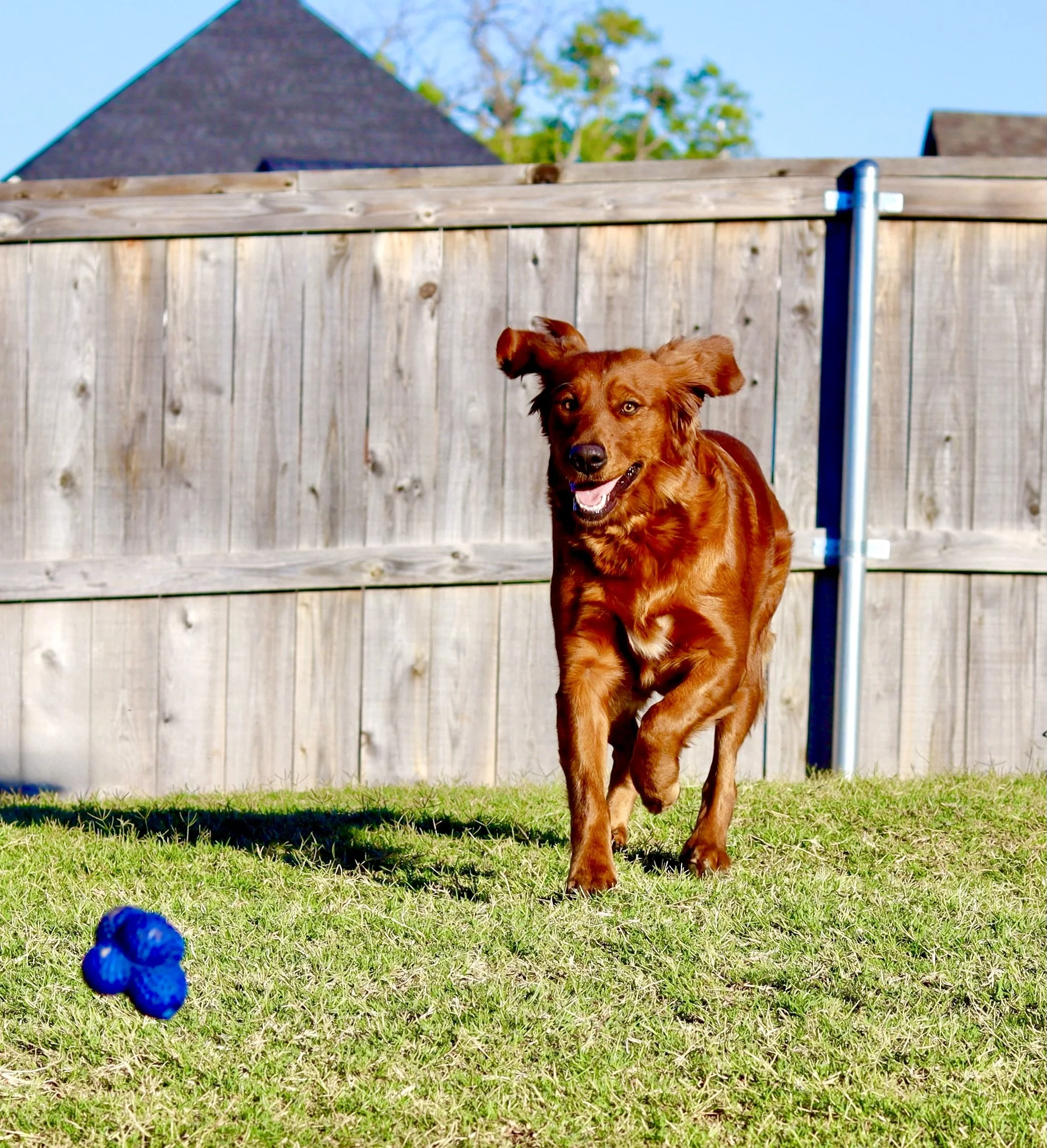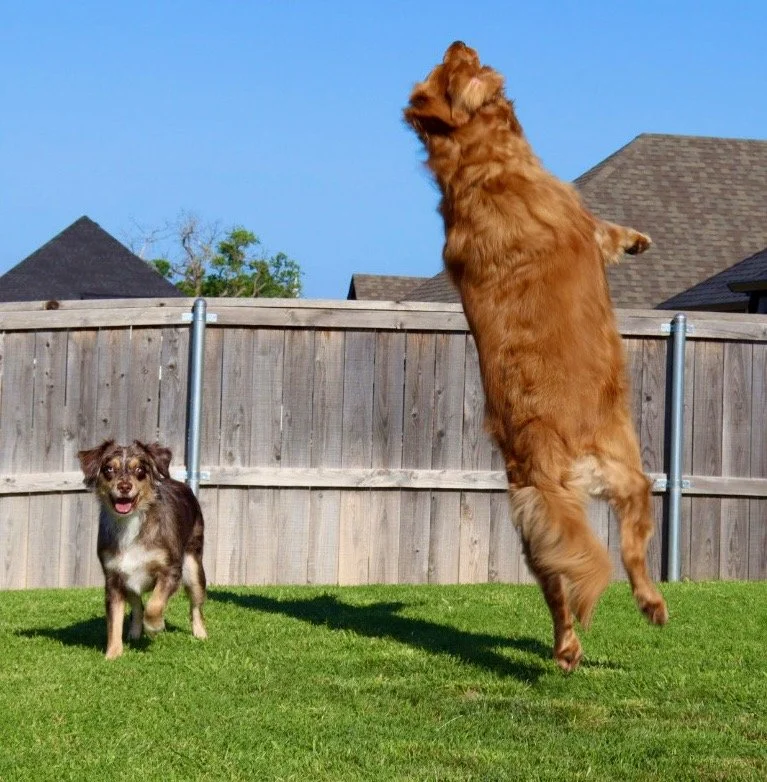Raising Healthy Goldens
Why Accolades Aren’t Important
Do bloodlines even matter when breeding golden retrievers? It has become completely frustrating with how often this breed passes away too young. It seems like more and more Golden Retrievers are dying before they even reach a reasonable age, and it’s heartbreaking.
There’s so much focus in the community on how many titles each parent dog has—champion lines, hunting titles, obedience titles—but I hardly ever see anyone talking about the importance of health and longevity. It’s frustrating because, especially in Golden Retriever groups, breeders are often asked about the titles of their dogs, as if those titles are the ultimate measure of a dog’s worth. If a breeder doesn’t have dogs with titles, some people in these communities believe their dogs have nothing to offer, as though achievements in competition automatically translate to good health and temperament. But what good is a dog with all the titles in the world if it’s plagued by health issues or has a shorter lifespan? The focus should be on the dog’s overall well-being, and ensuring that both health and longevity are prioritized as much as titles.
Have we become so fixated on the immediate accolades and achievements that we’ve lost sight of the bigger picture? The true goal should be ensuring these dogs live long, healthy lives, not just excelling in competitions for a short period of time. Longevity and well-being should be just as important, if not more so, than any title or award.
The answer is yes, bloodlines can play a significant role in the health and longevity of Golden Retrievers. Breeding practices affect genetic health, and well-established bloodlines often focus on minimizing hereditary health problems. Reputable breeders select breeding pairs based on factors such as:
1. Genetic testing: To screen for common health issues in Golden Retrievers, such as hip dysplasia, elbow dysplasia, eye problems, and heart conditions.
2. Health history: Dogs with a family history of long-term health and longevity are often prioritized.
3. Temperament: A good temperament is important, as well as general physical health.
Now, getting back to titles, it is so important to note that the stress and physical strain associated with some high-intensity activities (such as hunting or agility trials) could have potential negative effects on certain dogs, especially if they are overworked or not given adequate rest and recovery time.
Over time, those trials can become a risk factor to the dog’s joints and overall health and stability. It seems that with this breed, constant competition would amplify what they are already highly at risk for.
It is well known, Golden Retrievers are particularly prone to joint issues, including hip dysplasia and arthritis, which can be exacerbated by overexertion or excessive physical activity, especially as they age. Hip dysplasia is a genetic condition where the hip joint doesn’t develop properly, leading to instability, pain, and eventually arthritis. Over time, if a Golden Retriever is involved in activities that put excessive stress on their joints, such as running or jumping too much, it can worsen these conditions.
To keep our Golden Retrievers healthy and minimize joint stress, we as breeders:
• Avoid excessive high-impact activities, especially during their growing phase (before 12 months).
• Provide low-impact exercise like swimming or walking, which is gentler on the joints.
• Keep them at a healthy weight with a raw diet, as excess weight can put additional strain on their hips and joints.
• Give joint supplements, like glucosamine and chondroitin, to help maintain joint health.
The real focus for any responsible breeder or owner should be on health testing, ensuring that your Golden Retriever has the best chance for a long, healthy life. Health tests for hips, elbows, eyes, and heart, along with genetic screening, are far more valuable indicators of your dog’s well-being than any ribbon or trophy. These tests give you crucial information about your dog’s potential for future health issues, and taking the time to screen and care for their health can make all the difference in their longevity and happiness. By using health testing to screen for hereditary diseases, we can select healthy breeding pairs, which helps ensure healthier puppies and reduces the likelihood of passing on genetic diseases.
While titles may seem appealing and provide financial benefits for breeders, they should not be the driving force behind breeding decisions or expectations. Instead, at Raised Right Pups, we prioritize the health and happiness of our dogs by focusing on responsible breeding practices and performing extensive health screenings that truly benefit their future, not just a momentary achievement. After all, a Golden Retriever’s true value lies in their companionship and longevity, not in the number of titles they can earn.
It is safe to say that the number of buyers who choose a Golden Retriever solely for the purpose of pursuing titles is a significant minority.
Most Golden Retriever buyers are motivated by the breed’s reputation as friendly, loyal, and great family pets. Many of our Golden Retriever buyers, purchase for companionship, emotional support, or as active family members rather than with the goal of entering dog shows or competitions. While a minimal amount of buyers may indeed seek dogs with a history of titles for potential competition or breeding purposes, it is typically other breeders who will pursue these dogs, or a much smaller portion of the overall golden retriever population.
We have established that trials and shows for dogs, particularly those that involve intense physical activity like jumping, running, and agility work, can potentially put stress on their joints in the future. It’s true, repetitive movements and high-impact activities can contribute to joint strain, leading to conditions like arthritis, hip dysplasia, or other musculoskeletal issues later in life.
When it comes to Golden Retrievers, titles should not be a necessity. While it might seem impressive to see a dog with multiple titles or awards, this pursuit can have unintended consequences on your dog’s health, particularly their hips and joints, especially in the Golden Retriever breed. Many dog owners and breeders focus on titles—whether it’s from dog shows or performance competitions—but these titles often only show that a dog has learned some tricks or can perform certain tasks. While that might be satisfying for you as a breeder, it doesn’t equate to long-term health and well-being for your dog and your typical puppy buyers. So what’s the point? Why all the judgment on breeders that don’t have titles?
As noted above, excessive training, particularly with physical demands, can place stress on your Golden Retriever’s joints, leading to potential hip dysplasia, arthritis, and other joint issues later in life. These conditions can significantly impact the quality of life for your dog, and as a breeder who loves every one of their dogs, no title is worth the pain, risk, and discomfort that could result for our dogs.
Overall, in the realm of breeders, it’s common for those focused on show-quality dogs to select breeding dogs based on show potential, but the general consumer market often prioritizes temperament, health, and companionship over achievements in the competitive dog world, and we happen to agree with them. Like most buyers, RRP instead emphasizes key factors such as health, temperament, and suitability, aiming to choose the best family pets that enjoy a long and healthy life.
Another important point to note, is that showing and titling dogs typically require more vaccinations than regular home pets, mainly because they interact with a larger number of dogs in diverse environments, often with owners who may not vaccinate their dogs. This increases the risk of disease outbreaks at these lively events. How does this create a negative correlation?
As a breeder, we do constant research and speak to multiple vets about our concerns. Especially in this profession, knowledge is power and a necessity when breeding a specific breed. Therefore, it is only natural for us to ask questions, be intuitive, and ultimately, be concerned about the potential long-term effects of vaccines, especially in breeds like Golden Retrievers. There has been much research suggesting a possible link between vaccinations and certain types of cancer in dogs, though this is a complex and somewhat controversial topic.
Golden Retrievers, in particular, are a breed that is more predisposed to developing certain types of cancers, such as hemangiosarcoma and lymphoma. Even though the evidence is not conclusive, studies have suggested a potential association between the frequent administration of vaccines and an increased risk of cancer.
In summary, because there is evidence linking vaccines to an increased risk of certain types of cancer in dogs, especially in specific breeds like Golden Retrievers, we believe the overall risks of showing or titling our dogs is not worth it, considering the constant and recommended vaccinations and the future joint health risk it presents in our dogs. We will continue to research and educate ourselves, as well as work with our vet to tailor our Goldens’ specific needs and health status, ensuring their longevity and quality of life for years to come.
While we do not compete for formal titles, we do provide them with the same level of comprehensive training and care. This includes consistent daily exercise, fetch, short runs, and a raw diet. In addition, we focus on reinforcing manners, basic obedience, and a variety of tricks every day. We also engage them with puzzle games, snuffle mats, and other activities designed to stimulate their minds, ensuring they receive ample mental enrichment daily. As you can tell, at RRP, we are particularly passionate about ensuring that our Golden Retriever breed lives a long, healthy, and happy life. That’s why we’ve dedicated ourselves to not only giving our dogs the best life we can provide, but also providing thorough research to help our dog owners make informed decisions about their pets’ health. We understand that every dog and every breed is unique, and we hope that our insights into showing/titles, exercise, and preventive care resonate with buyers who are equally committed to the well-being of their furry companions.
Our goal is to empower pet parents with knowledge, from understanding breed-specific health considerations to offering tips for maintaining optimal health throughout each stage of life. We hope our customers not only appreciate the time and effort we put into gathering this information but also use it to enhance their dogs’ lives, ensuring that their beloved pets live as long and joyfully as possible. We truly believe that informed owners are the best advocates for their dogs’ health, and we’re here to support you every step of the way.
Thank you for trusting us with your dog’s well-being. Here’s to many happy, long, healthy years together!







